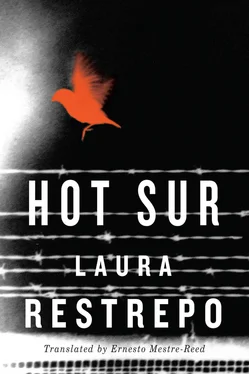Laura Restrepo - Hot Sur
Здесь есть возможность читать онлайн «Laura Restrepo - Hot Sur» весь текст электронной книги совершенно бесплатно (целиком полную версию без сокращений). В некоторых случаях можно слушать аудио, скачать через торрент в формате fb2 и присутствует краткое содержание. Год выпуска: 2015, Издательство: AmazonCrossingEnglish, Жанр: Современная проза, на английском языке. Описание произведения, (предисловие) а так же отзывы посетителей доступны на портале библиотеки ЛибКат.
- Название:Hot Sur
- Автор:
- Издательство:AmazonCrossingEnglish
- Жанр:
- Год:2015
- ISBN:нет данных
- Рейтинг книги:5 / 5. Голосов: 1
-
Избранное:Добавить в избранное
- Отзывы:
-
Ваша оценка:
- 100
- 1
- 2
- 3
- 4
- 5
Hot Sur: краткое содержание, описание и аннотация
Предлагаем к чтению аннотацию, описание, краткое содержание или предисловие (зависит от того, что написал сам автор книги «Hot Sur»). Если вы не нашли необходимую информацию о книге — напишите в комментариях, мы постараемся отыскать её.
María Paz is a young Latin American woman who, like many others, has come to America chasing a dream. When she is accused of murdering her husband and sentenced to life behind bars, she must struggle to keep hope alive as she works to prove her innocence. But the dangers of prison are not her only obstacles: gaining freedom would mean facing an even greater horror lying in wait outside the prison gates, one that will stop at nothing to get her back. Can María Paz survive this double threat in a land where danger and desperation are always one step behind, and safety and happiness seem just out of reach?
Hot Sur — читать онлайн бесплатно полную книгу (весь текст) целиком
Ниже представлен текст книги, разбитый по страницам. Система сохранения места последней прочитанной страницы, позволяет с удобством читать онлайн бесплатно книгу «Hot Sur», без необходимости каждый раз заново искать на чём Вы остановились. Поставьте закладку, и сможете в любой момент перейти на страницу, на которой закончили чтение.
Интервал:
Закладка:
“Not exactly, but if it were about the book, would you tell me where she is?”
“Oh, my dear, if I only knew… I really have no idea, I swear. Didn’t I tell you that the last time I saw her was when I visited her in prison?”
“Didn’t you say that the lawyer brought her here one day in a red sports car?”
“Mr. Rose, pardon me, but perhaps it’s best if you go. I don’t mean to offend you. If it were up to me, I’d love to continue our pleasant chat. But my husband is about to arrive, you know…”
On the return trip on the ferry from Staten Island, Rose went off on his own, away from the other passengers, his eyes fixed on the wide foamy wake the color of tar trailing the ferry. He had bought an extra-large bag of popcorn and was tossing it in the water piece by piece without eating a single one and when he was finished threw the bag as well and watched it get caught and swallowed by the whirlpool. That night, he stayed in the studio that his son had rented, a room with a bathroom, a closet, and a mini kitchen packed into an area of less than eighty square feet in a battered building on St. Mark’s Place. It had not been more than twelve hours since he had said good-bye to Socorro Arias de Salmon, or rather since she threw him out. The phone rang. It wasn’t yet dawn. Rose answered half-asleep, not knowing who the man’s voice could belong to at such an hour.
“Are you asleep?” the voice asked.
“Not anymore.”
“Forgive me, my friend, but this is urgent. We have to leave in one hour,” someone, whom Rose finally recognized, ordered. It was Pro Bono.
From Cleve’s Notebook
Paz has become a disturbing creature with two heads. A kind of bicephalous monster that I need to figure out, just to understand the tangle of feelings that she sets off in me. The Paz of the first head comes from a distant world that once, over there in Colombia, opened its doors for me, someone who I feel is a lot like me, my equal or even my superior, a hardy and tough woman who lives life with more intensity than I do, who is skillful at dealing with the other side of the tapestry, and at the same time more vulnerable and joyous, someone with whom I’d love to have the liberty to sit and talk for a few hours. Or go to the movies with and then to dinner. Or share a bed, that above all. Why not, what’s so strange about madly desiring a pretty girl, even if she’s your student, or is a prisoner and a delinquent? Of María Paz of the first head, I can say she’s dark-skinned and dark-haired without fear of offending, dark-complexioned and dark within because she’s impenetrable and because of that she’s disquieting. She’s someone who tears me away from my usual weariness of struggling against the obvious, what’s clear and pure and cryptic. My friend Alan, who lives in Prague, invited me to visit him. “Come quick,” he hastened to say in the letter, “before capitalism polishes off everything.” Maybe that’s what I’m searching for in Paz, someone who has not been polished off by capitalism. I want to touch her skin, which is different, feel her dark skin on my fair skin, confront the threats and promises of such contact, submit myself to the dreadful and almost sacred initiation it implies. Cross the threshold. The Song of Songs talks about the union with a woman as “dark and beautiful… as the tents of Qedar.” That’s how I see this first Paz, dark like the tents of Qedar, dark like Othello, whom Iago calls the Moor (from which comes morena ). I once read in a sports magazine a quote by Boris Becker, the tennis player who is white as milk and married a black woman, in which he astonishingly confessed that he had not realized how dark his wife’s skin was till the morning after their first night of love when he saw her naked on the white sheets.
The matter of the second head is more complicated because it is rooted in old fears and prejudices from which I cannot honestly say I’m exempt. This Paz of the second head is the same as the other one but seen from a different perspective, and so there’s an abyss between us. She’s someone who comes from a distant and incomprehensible universe comprising impoverished, famished, violent lands that were never properly liberated. And she also belongs to another race, and there’s the key, someone with a sign on her forehead indicating her race, which is not the same as mine, and of a color different than mine. Someone whom I’d be afraid to take to bed because in private she might behave differently and would have other sexual customs, and perhaps would emit a strong and foreign odor. Someone who is nourished by things I don’t even dare put in my mouth. Someone with a pending debt to justice, capable of committing misdeeds I can’t even imagine. Another kind of human being altogether, like those who walk barefoot in the stone-paved streets of their towns in religious processions, who farm corn in tiny parcels to feed their countless children, who become guerrillas and are tortured by some military dictator. And if that were not enough, this María Paz of the second head has an intense gaze that goes right through me. Deep down for us folks with light-colored eyes, those black eyes can hold a wickedness, something perhaps beautiful but also wicked. Think of a trap; all you have to do is watch Penelope Cruz in a mascara commercial to understand that those types of eyes can hypnotize you then molest you, or at least steal your cell phone or wallet. You would think that someone with blue eyes like mine would think twice about trusting a child, or a credit card, to someone with eyes as dark as my Paz’s. Before I could think of her as a person, this second María Paz would be a foreigner, an extrañero , with all the implications of suspicion and neglect the word connotes, coming from the Latin extraneo , disinherited, and extraneus , external, from the outside, strange, unusual, something that is not familiar. She’s a foreigner, from the Latin foras , outside, from beyond, someone who has come a long way, someone who has come from far off, the exterior. Or forastera , from fouris , door, entrance, someone who remains on the other side of my closed door, who doesn’t cross my entrance. And forastera again, from the Latin foresta , forest, jungle, someone from the forest, a savage, a jungle beast, and as such a threat to the peace and security of my house and what is mine. Someone, in the end, who we keep in a prison like Manninpox, like thousands of other Latinos and Latinas and blacks, simply because they fit the type I have just described.
5. From María Paz’s Manuscript
You had a distinct smell, Mr. Rose. I tried to get close to you, not to touch you, I wouldn’t have dared, but to smell you. You’re a good person, so you put on this face as if everything was normal. But you were so tense that an alarm zone formed all around you. I think there would have been sparks if any of us inmates had as much as grazed you. You seemed electrified, sir, at least at the beginning. During those first classes you were so tense you were almost trembling under your Lacoste shirts. It was understandable. It could happen to anyone who goes unprotected into that den of thieves. But we’re not all dangerous here; I want to make that clear. That’s only a small minority. There are some scoundrels, why deny it, bad women who would strike their own mothers. And I’m not talking figuratively. There was this inmate named Melissa who was serving life for killing her old lady by smashing her on the head with a toaster, she toasted her, she toasted her own mother. How much more evil can you get than that? So I don’t blame you for half shitting your pants while you were here, don’t think I don’t understand. I’m the first one to watch my back so I don’t get jumped. Anyway, I was drawn to the fact that you smelled like the outside world. The guards also come and go, they do it every day, but they don’t carry with them that whiff of fresh air. They’re as permeated with confinement as we are. For when it comes down to it, they too are prisoners, or almost, or worse than prisoners, ours at least is by force but theirs is of their own choosing. Your smell, Mr. Rose, brought me news of things so far out of my reach that I had begun to believe they did not even exist, that I was making them up, that they only lived in my longing for them. There are no windows in this restricted area to which I have been confined for a week, not one window. But in 12-GPU, where I was before and where I hope to return soon, there is a window that looks outside. You see, there are numerous windows in the compound, but they all face the inner yards. This is the only one that faces the street. High up on the wall, near the bathrooms, like an eye peering out on the world, or a little ship heading out onto it. Small, the window, nothing really much, and almost shuttered with bars. But you can get up on a bench so you’re at eye level with it and look out to the street, a portion only, in the distance, nothing special. There are no passersby, and not even a tree or a street sign, just a stretch of asphalt and the portion of a wall. Imagine a black-and-white photograph, one of those ones taken by mistake, where nothing or no one is in the frame. That’s all you can see; still, there is always an inmate up on the bench looking out, the eyes escaping to that place known as the outside world, the mind fleeing toward a son, a mother, a house, whatever it may be, any pleasant thing from her past life, like a garden, say, a plant that was watered every day and that has by now withered. Or a lover, there are many in here fingering themselves thinking of some guy on the other side. For even the lowliest among us has left something behind, something that is waiting for her and that glimmers in the glass of that window in 12-GPU near the bathroom. There’s always an inmate upon the bench, and five or six others in line waiting their turn. If one of them gets impatient, she screams at the one standing on the bench, “Get down, you bitch, you think that window is yours?” But the others immediately shut her up. They respect that moment and you have to know how to wait for it calmly, to be able to look out and breathe a little. Watching that stretch of road, I ask myself, Is that America? Or I should say I ask Bolivia, the deceased, because lately I have taken to chatting with her. What do you think, Mother, you know better, is it just a dream after all? Or is America really in here?
Читать дальшеИнтервал:
Закладка:
Похожие книги на «Hot Sur»
Представляем Вашему вниманию похожие книги на «Hot Sur» списком для выбора. Мы отобрали схожую по названию и смыслу литературу в надежде предоставить читателям больше вариантов отыскать новые, интересные, ещё непрочитанные произведения.
Обсуждение, отзывы о книге «Hot Sur» и просто собственные мнения читателей. Оставьте ваши комментарии, напишите, что Вы думаете о произведении, его смысле или главных героях. Укажите что конкретно понравилось, а что нет, и почему Вы так считаете.












